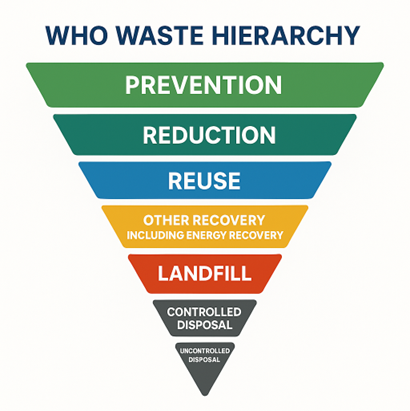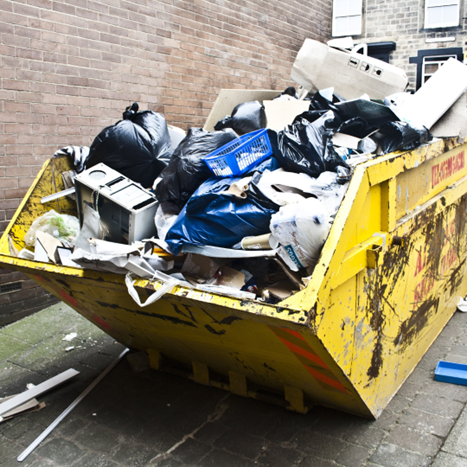Global Best Practices in Waste Management
Waste has been following humans around since the dawn of time. To deal with this problem, ancient civilisations built sewers and dumps or burnt their rubbish. Today, most solid waste is landfilled. With landfilling, waste gets buried and compacted between layers of soil. This method of waste disposal has been used for years, but it is unsustainable.
The world is now looking for better ways to manage its waste. Environmental groups are making suggestions for world leaders, and nations are strengthening their waste management policies. Today, we gather best practices from our global peers.
Guidelines From the International Solid Waste Association (ISWA)
ISWA is an international group of businesses, NGOs, and government bodies. It focuses on all aspects of waste management and publishes educational resources for its members and the public. ISWA has developed five core principles of sustainable waste management:
- Human rights
- Political commitment
- Waste planning
- Economics of waste
- Circular economy
Under these principles, ISWA recommends waste management that prioritises human health and safety while reusing materials instead of throwing them away. It endorses the “polluter pays” principle and encourages private investors to demand proper financial planning from government-run waste agencies.
ISWA also stresses the importance of developing affordable, context-specific waste systems that suit the social and economic conditions of your country.
Guidelines From the OECD
The OECD is a group of countries that work together for sustainable development. It creates international standards for solving socio-economic issues and has named South Africa as one of its five Key Partners. The OECD has official recommendations for the following areas:
- Waste management policies
- Environmentally sound management (ESM) of waste
- Waste paper recovery
- Reuse and recycling of beverage containers
- The polluter pays principle
These recommendations stress the importance of limiting waste at every stage of production, not just during disposal. They also encourage recycling, reclamation, and a free flow of information between producers, recyclers, and governments.
Guidelines From the World Health Organisation
The World Health Organisation (WHO) examines how poor waste management affects human wellbeing. Its Compendium on Health and Environment contains international guidelines on solid waste disposal. The most important best practice from this publication is the waste hierarchy.
Following the waste hierarchy means preventing and reducing waste as much as possible.
Waste that cannot be prevented should be reused or recycled, with very little going to landfills and dumps. This approach should be taken at every stage of waste management.

The WHO also endorses separation at the source, incentivised recycling, and formal collection systems for e-waste. It advises governments to monitor their soil and Water quality for waste contamination and encourages policies that protect the health of waste workers.
Guidelines From the U.S. EPA
In 2020, the U.S. Environmental Protection Agency published an official guide for solid waste management. This guide outlines best practices for cities in developing countries. Like the WHO, the EPA also suggests following a waste hierarchy that prioritises reduction and prevention. It suggests following the “Five Ps” of solid waste management:
- Planning – create a detailed strategy that considers the unique types of waste in the area.
- Price – base the costs on the economy of the country. Look at EPR and private partnerships.
- Publicity – awareness and education are key to resident participation
- Politics – all waste management needs strong political support.
- Perseverance – strategies should be sustainable in the long term.
Understanding the types of waste you’re dealing with is a key best practice of the U.S. EPA. It encourages cities to conduct thorough research before building recycling and treatment facilities. This should be done by engaging all stakeholders in the waste cycle, including the informal sector.
Guidelines From the European Commission
The European Union is a leader of environmental policy, therefore, many non-EU nations look to the EU as an example of sustainability. Europe created the Waste Framework Directive to govern waste management. Its goal is to become a climate-neutral economy by 2050.
According to the Waste Framework Directive, waste management activities may not:
- Harm the environment or human health
- Put water, air, soil, plants, or animals at risk
- Cause a disturbance through noise or odours
- Damage the European landscape and tourism destinations
The Waste Framework Directive supports extended producer responsibility and encourages reuse and recycling over recovery and disposal.
Tying it All Together: Best Practices for South Africa
South Africa’s waste management system is under reconstruction. Recent changes in legislation, including the introduction of EPR and the Climate Change Act, will shape how we handle waste moving forward. The international guidelines mentioned above provide a vision of where the world is going and how we can join the journey.
So, what do all these guidelines have in common?
-
Prevention is better than cure.
Reducing waste at the source is easier and more economically viable than trying to stop it once it becomes a problem. Strategies should focus on using fewer materials and making products reusable and long-lasting.
-
Make decisions based on data.
You cannot change what you do not measure. Knowing where the waste comes from and the effect it’s having can help South Africa build a waste management system that targets the right things.
-
Waste is everyone’s problem.
Collaboration is key to tackling our country’s waste problems. That means getting private businesses involved through EPR and take-back schemes, working with the informal sector, and increasing public participation in recycling.
-
Choose what works at home, not overseas.
Waste management strategies should be context-specific and based on local data. Getting this right makes recycling more economically viable and prevents wasteful investments in the wrong technologies or relying on energy-intensive imports.
For more information about waste management in South Africa or to register your business for EPR, please contact eWASA.
LIST OF SOURCES:
- https://www.iswa.org/wp-content/uploads/2024/11/ISWA_Sustainable-Waste-Management_Guide_Digital_.pdf
- https://legalinstruments.oecd.org/en/instruments/OECD-LEGAL-0147
- https://eur-lex.europa.eu/legal-content/EN/TXT/HTML/?uri=CELEX:52020DC0098
- https://cdn.who.int/media/docs/default-source/who-compendium-on-health-and-environment/who_compendium_chapter4.pdf
- https://www.epa.gov/sites/default/files/2020-10/documents/master_swmg_10-20-20_0.pdf
- https://environment.ec.europa.eu/topics/waste-and-recycling/waste-framework-directive_en


